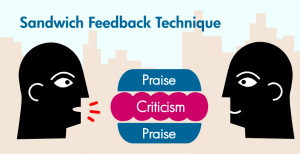 The “Feedback Sandwich” is a management tool that got popular in the 90s and you still see it around, used by management consultants who are at the trailing edge of their profession and by well-meaning but deluded communication people like marriage counselors.
The “Feedback Sandwich” is a management tool that got popular in the 90s and you still see it around, used by management consultants who are at the trailing edge of their profession and by well-meaning but deluded communication people like marriage counselors.
If you haven’t heard of it, you’ve probably experienced it. When you need to tell somebody about some room for improvement, you’re supposed to stick it between two compliments. For example, if you have a buddy who keeps showing up late for stuff, you could say:
- Comment One: Man, I really like hanging out with you because you say such funny and wise stuff.
- Comment Two: I really wish you’d show up on time, though. It’s kind of inconsiderate when you leave me hanging.
- Comment Three: Because I just know when you show up I’m gonna have a really great time.

See? You sandwich the less fun feedback between two pieces of fun feedback. That’s where it gets its name. It’s a fairly simple way to make a bitter pill easier to swallow.
And it Makes You Deserve a Punch in the Neck
Yes, I can see how moderately intelligent, well-meaning people could use a feedback sandwich. That still makes them fully deserving of a roundhouse punch square in the damn neck. Here’s why:
- It’s based on the condescending assumption that the person you’re talking to can’t take his or her medicine straight. We’re grown-ass adults here. If we can’t hear and act on suggestions to become more awesome, what is the point?
- It wastes my time. By adding the other two comments, you triple how long it takes to have this conversation. Get to the point and let me commence to acting on your suggestions.
- The compliments are (usually) insincere. You’re only mentioning them because you’re doing the sandwich. We know it. You know it. Tell me I’m awesome because I’m awesome. Not because you identified a way in which I am not awesome.
- Even when they are sincere, you’re still doing the sandwich. So they seem insincere. There aren’t a lot of better ways to make somebody doubt how much you value the good work they do.
- We know what you’re doing. All of us. Every time. You know how you feel when a sales guy tries some obvious old sales trick on you and you catch him at it? You know how that ruins the trick and usually blows the sale? That’s exactly how we feel when you do the sandwich.
Alternative: Atkins Feedback
The Atkins Diet helped a metric shitton (approximately 1.1 imperial buttloads) of people lose weight by basically letting men eat the way we would anyway if our wives weren’t watching. Meat and cheese all day long, all day strong. Hamburger hold the buns, please! Sandwich, hold the bread!
You see where this is going. Get lean and mean and peel the bread away from your weak sister feedback sandwich. This means doing one of two things, depending on where you are in the feedback giving food chain.
- If You Are Giving Feedback have the respect to assume the person you’re talking to can (a) take it like an adult and (b) see through transparent mind games. Stand and deliver, then let the subject commence to fixing what you needed to talk about.
- If You Are Receiving Feedback respect yourself enough to admit that you have flaws. We all have flaws. And remember that we can’t ruthlessly eradicate those flaws if the people in our lives don’t call us on our bullshit. Take the feedback as the constructive criticism it’s meant as and don’t go all Sylvia Plaith on us.
Easy enough? Be honest with people and yourself. Use that honesty to become the better person you want to be, rather than merely the person you are.
Readers, share your most hilarious experience with the feedback sandwich. Anybody who can honestly report neck punching gets a free copy of one of my books.

If this were a feedback sandwich, I would first say how thought-provoking and funny this article is, and how much I enjoy reading your work, Jason. But since you specifically request that I strip the bread off the sandwich, I have to say up front that I disagree with much of what you have to say here.
Point the first: The Condescending Assumption. Although you, and many people with your emotional maturity, can take their medicine straight, in practice most of the world does not operate this way. The spoonful of sugar often is necessary to keep from alienating the person receiving feedback. In her corporate career, my wife encounters a large number of people who cannot live up to the ideal and accept criticism gratefully or even quietly. The Feedback Sandwich is a vital tool to handle people like this.
Point the second: The Confrontation Conundrum. Jason, you love a good scuffle; that’s why you’re such a successful martial artist. I would venture to say, however, that most people (myself included) do not love confrontations. We find it difficult to get in someone’s (figurative or literal) grill and break hard news to them. The Feedback Sandwich helps people like us by making the uncomfortable message more positive. “You’re great. Except for this one area, you’re great.”
Point the third: I Like The Bun. Your Atkins diet point is well taken, except for one thing. I like a good bun on my burger, maybe a toasted brioche bun with a little aioli on it. It’s squishy, so it doesn’t fill me up too much, but it tastes delicious. The same is true of the positive comments in a Feedback Sandwich. These give the recipient a warm, squishy feeling in which to nestle the burger of…geez, I think this analogy is getting creepy.
Point the fourth: There Are Good Buns and Bad Buns. I agree that in many cases, the Feedback Sandwich tastes like crap, because often it is made with stale, nasty, insincere grocery store buns, but your argument is that there ARE NO good buns. That’s just wrong. The Feedback Sandwich, as a tool for communication, is like any such tool–in some hands it produces good results, and in others it just makes a mess.
In conclusion, since this is not a Feedback Sandwich, I do not want to waste your time by saying that I’m looking forward to hearing your response, nor that I eagerly await your next blog post.
Those are reasonable, well-thought-out objections.
You are full of crap.
Nice tie.
But seriously, folks…you’re right. The Sandwich is so popular because a lot of folks do seem to need it and a lot of other folks aren’t comfortable enough with confrontation to give powerful feedback without it.
That said, would this still be true if people didn’t use the Sandwich? I’m comfortable with complaints and confrontation _because_ I’m experienced with direct, no-bullshit feedback. I didn’t love it at first, but got used to it and now prefer it. The Sandwich seems like enabling to me.
When did we have a meeting where we decided to cater to the weakest, saddest aspects of our personalities instead of engaging in behaviors that make us stronger, more powerful better more able to improve? Why wasn’t I invited?
I have seen little of this (the strong, forward criticism section) from people and use this myself. I’m seen as an asshole and truthful person because of it, and that’s always been okay. It’s better to not waste anyone’s time.
Another facet that I left out of my first reply, and one that I haven’t experienced myself:
If a man gives criticism without using a technique like “The Sandwich,” he is seen as a straight shooter, a no-bullshit kind of guy who tells it like it is.
If a woman does the same thing, she’s a bitch and is dismissed out of hand.
This comes from my wife, who as I mentioned has a whole career’s worth of experience with this sort of thing. I still believe it’s all in how the technique is deployed, and under what circumstances. My wife also points out that there are many times when The Sandwich is utterly inappropriate, such as giving disciplinary feedback. Instead of complimenting the person, you tell them what they did wrong, and if they don’t shape up they will face punishment, possibly even termination. Then you shut up and don’t compliment them. So the Sandwich is not a universal tactic.
That is a very good point….but it also has a flip side. If your wife uses the softer approach, some of her male colleagues will dismiss her as being too soft and feminine.
Women get hosed in executive positions. If they “communicate like a woman” they’re written off as soft. If they “communicate like men” they’re written off as ballbusters.
Damned if they do, damned if they don’t.
During my umpteen decades in management (managing technical professionals, which can require different skills than other management positions), we were always taught to know your audience, and target your communication appropriately. What’s important is that your message will be heard, respected and acted on.
In that sense both of you may be correct (you just have different audiences), or maybe you are both incorrect.
You are of course correct. At the core, I’m mostly lamenting that you’re right. Of course not everybody can take their medicine straight. Life would be better if everybody could.